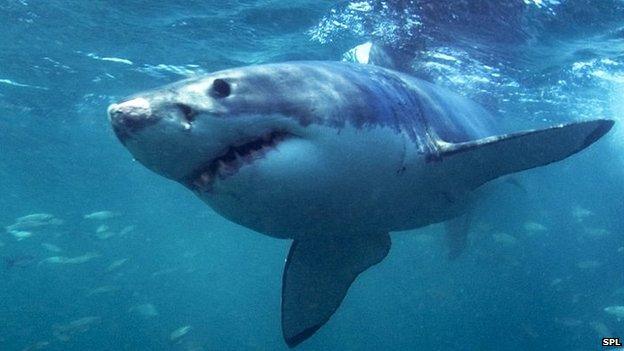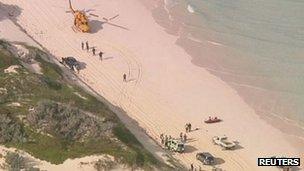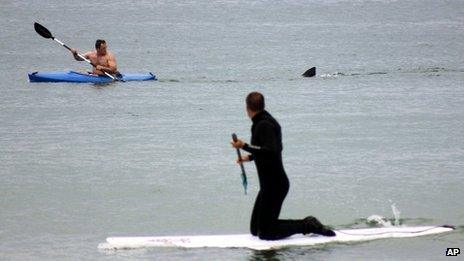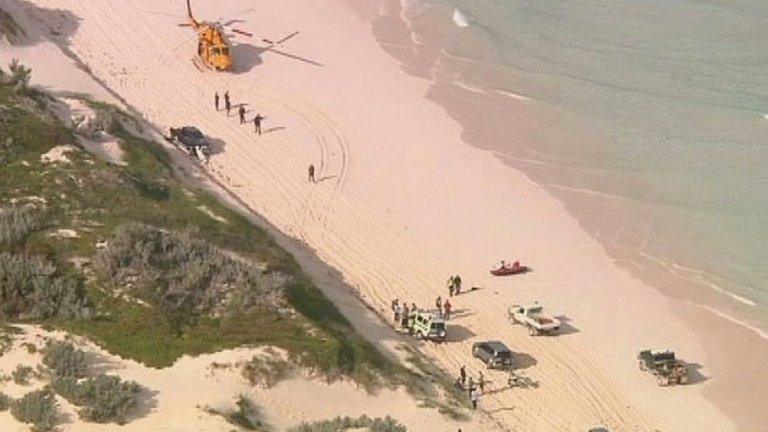Australia shark attacks: Would cull work?
- Published

A white shark is thought to have been responsible for the latest fatal attack
The fatal shark attack off western Australia at the weekend was the fifth such incident in less than a year.
The death of surfer Benjamin Linden, 24, who was apparently mauled by a large white shark, has sparked concern among government officials and prompted calls for the animals' protected status to be lifted.
But are unprovoked attacks really rising in the region, and, if so, what might be behind such a trend?
Dr Bob Hueter, director of the Mote Marine Laboratory's Center for Shark Research in Sarasota, Florida, cautions against jumping to conclusions.
He told BBC News: "When you have multiple attacks, it can be one of two things or a combination of both. The most obvious is that there are more sharks there in a place where people frequent for some reason."
Dr Hueter pointed to the example of Cape Cod in Massachusetts, where great white sharks are increasingly coming close to beaches popular with bathers because conservation efforts have caused populations of seals - which the sharks prey on - to rocket.
"The other factor - which is often the most difficult one to understand - is just this concept of statistical clustering," he explained.
"Because you get two events that seem to be close together in time and space, doesn't mean you've got a trend.
"That's what the media often doesn't get, as soon as you get a couple of these together they're talking on the evening news about an increase in this, or an increase in that. And that's just not necessarily the case."
The death on Saturday of Mr Linden has re-ignited a debate on lifting the protection afforded to great whites, to allow either fishing or a cull.

The attack on Saturday was the fifth fatal attack in the region in about 10 months
After the last fatal attack in March, state premier Colin Barnett ruled out a culling programme, saying it was impossible to protect all people at all times.
But talking to Australia's ABC television, external, fisheries minister Norman Moore said: "I think we need to have another look now to see whether or not there's been a significant increase in great white numbers since they became protected. And if that's the case, should they still be on a protected list?"
He suggested researchers look at whether there had been an increase "commensurate perhaps with an increase in the number of whales going up the coast, a number of seals that are also protected - which are food for great white sharks."
Rare occurrences
Sharks are common in Australian waters, but fatal attacks remain rare, averaging about one a year over the last two decades.
John G West, curator of the Australian Shark Attack File, pointed out that there were an average of 87 drownings per year on the country's beaches.
"People should be more concerned with swimming at a beach than being killed in a shark attack," Dr West, who is based at the Taronga Conservation Society in New South Wales, told BBC News.

Martin Kane was knocked into the water when a great white attacked his surf ski near Perth in June
He added: "For the last 100 years there have been as many as five occasions where there have been over 10 shark attack fatalities and eight occasions where five fatalities have occurred over a two year period. The events in Western Australia over the last two years are unusual in that they occurred in the one State.
"What is known is that white sharks in particular do swim along the Western Australia coast at various times of the year on their way between feeding and possibly mating grounds.
"They have been doing this for millions of years. The 'path' they travel brings them in close contact with the shoreline and in some case with people in the water."
Last year, Dr West published a scientific paper, external showing that the total number of shark attacks in Australia has risen from about 6.5 incidents between 1990 and 2000 to 15 incidents per year in the last decade.
The rise, he explained, coincided with a number of factors: an increasing human population, more people visiting beaches and a rise in the popularity of water sports. People are also accessing previously isolated parts of the coast, getting into the water over a larger part of a shark's range.
But Dr West pointed that there was no evidence that increases in shark numbers were influencing the rise in attacks in Australian waters.

At Cape Cod in the US, great whites have been coming closer to shore
"The increase in shark attacks over the past two decades is consistent with international statistics of shark attacks increasing annually because of the greater numbers of people in the water," he wrote in the journal Marine and Freshwater Research.
Christopher Neff, who researches the political dimensions of shark attacks at the University of Sydney, called the situation in Western Australia "tragic", adding: "Clearly there is some confluence of sharks and human behaviour that is taking place."
He told BBC News: "In my estimation, we need to recognise that there is an increasing number of people in the water, for long periods of time, doing more things, and more often. Right now it is winter in Australia and it is still surfing season.
"While Western Australia can be warmer, the fact that surfing and swimming has become more of a year-round activity with the addition of better wetsuits and boards adds to risk level."
Dr West added: "White sharks in particular are very inquisitive and are known to investigate anything that floats including cigarette packets, foam floats and buoys, surfboards and occasionally humans. The results of these investigations can result in severe and sometimes fatal consequences."
'Prevention better'
On the question of culling or fishing sharks, Dr Hueter told BBC News: "Removing the sharks has never been a solution in any of these cases. The better approach is to manage people's behaviour."
He said it was more productive for authorities to implement measures such as restricting certain areas of coast or restricting the use of beaches at certain times. It may even be prudent to avoid wearing shiny jewellery, as it can reflect light in a way that resembles the sheen from shoals of fish.
Dr Hueter said he recommended that people using Florida's beaches during the summer also steer clear of swimming in the water at night or during twilight hours because sharks were actively feeding during in that period.
Sharks are also less reliant on their vision for catching prey at night, so they have fewer cues for distinguishing a person from more suitable prey.
"I say: 'Between the months of five through nine (Florida's summer months), go swimming in the ocean from nine to five.' What we find is that there are more incidents during the day, because there are so many more people in the water during the day. But if you go swimming at night, you stand out much more, and your individual risk rate goes right up."
Commenting on the situation in Western Australia, Christopher Neff said: "The fact is that in Australia there are surfers going to isolated surfing spots everyday.
"I think the test is in recognising that the beach is the wild and we assume these risks whenever and wherever we go into the water."
- Published14 July 2012
